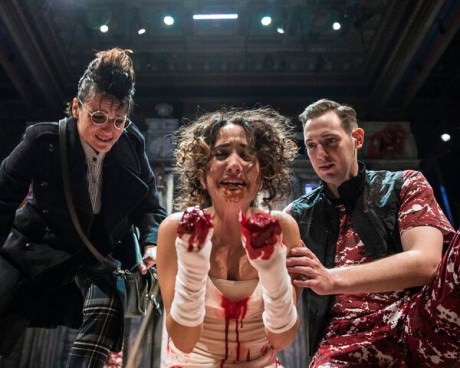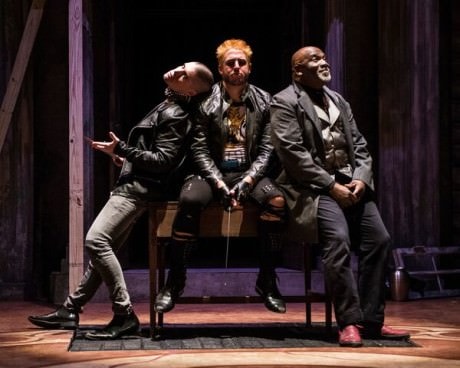“We are all undone!” a character hysterically cries halfway through Chesapeake Shakespeare Company’s production of Titus Andronicus. Well, thanks for stating the obvious. You would had to have been asleep not to notice that things were unraveling in this wild, off-the-wall version of Shakespeare’s notorious gore-fest. The government is crumbling, the body count is rising, the heads are rolling, the blood is overflowing and, yes, this is probably not going to end very well.

Titus Andronicus is one of Shakespeare’s less frequently performed plays and is believed to be his first tragedy. In it, he explores subjects that he came back to over and over again throughout his life: revenge, family honor, and corruption through power. However, there is a bleakness here that, perhaps, makes Titus stand out from the canon because, unlike most of his other work, there is no hope, no chance for redemption.
From the outset, Shakespeare gives us a world that is black. There are no winners or heroes. A corrupt government reaps the spoils of a vague war, and deals in the currencies of people and power. A sordid game of revenge and one upsmanship is played, with forgiveness and retreat no option for surrender. This could be today’s headline, part of a speech from a fear mongering politician or a warning from a fanatical church about the end days. But, it is essentially the 420 year old plot of Titus Andronicus. Director Ian Gallanar describes the play as having a “punk rock” sensibility. Indeed, if The Winter’s Tale is Shakespeare as Michael Buble, Titus Andronicus is Shakespeare as Sid Vicious, young, rude, crass, and pissed off.
As the play begins, Saturninus (Vince Eisenson) and Bassianus (a slick Keegan Cassady) are vying for the seat of the Roman emperorship left empty by their deceased father. Titus (Michael P. Sullivan), Rome’s most honored general, return’s home from wars against the Goths with their Queen, Tamora (Karin Rosnizeck), her sons, and her lover, Aaron, the Moor (Gregory Burgess) as his captives. Titus sacrifices Tamora’s eldest son, and Tamora vows revenge. So begins the turning of the bloody wheels of this tale and before all is said and done there will be beheadings, and behandings, shootings and stabbings, two characters will end up eaten and most of our characters will end up dead.
According to the program notes the setting is the 1980s in America, but as I took in Jacy Barber’s costumes that ran the gamut from mod suits in muted colors to steampunk to military garb and Kathryn Kawecki’s three-tiered set that resembled a a bombed out mansion, defaced with graffiti and abandoned mid-reconstruction, I found myself in some strange brew of the 1960’s England of A Clockwork Orange, John Carpenter’s vision of a 1997 NYC filtered through the lens of his 1981 film Escape from New York, with generous nods to the work of Quentin Tarantino and David Lynch, heavy on the Blue Velvet. I found it best not to think too much as I trusted the director and his actors and leapt with them on strange trip.
When he lets his cast play, Gallanar’s production really soars. Sometimes, it’s as easy as letting the actors speak the text, and they are afforded ample opportunity to do so in the large playing area in front of Ms. Kawecki’s looming, haunted set.
Gallanar has assembled a generally strong cast. I was particularly impressed with Vince Eisenson, as Saturninus, looking like a lean Jon Hamm, who is ultimately declared emperor of Rome and is blinded by the feminine wiles of Tamora, who he takes as his Empress; Rachael Jacobs as Titus’ daughter Lavinia. With features resembling a porcelain doll, she is, in an act of unspeakable violence, defiled early in the play. Consequently, she plays the rest of her scenes using only gesture and, in that sense, hers may be the most challenging role. The image of her standing in a crisp pale pink poncho, tight curls atop her head, youthful alabaster skin glowing while collecting the blood from the slit throats of Tamora’s sons in a silver bowl was, for me, the most unsettling image of the play.
Karin Rosnizeck and Gregory Burgess, were electric as Tamora and Aaron, respectively. From the first time we see her pleading for her son’s life while chained to a whipping post, Ms. Rosnizeck made this Tamora’s court. She wasn’t so much chosen by Saturninus to be Empress as destined for it. As embodied by Ms. Rosnizeck her thirst for bloodlust, knew no bounds. It is, dare I say, a delicious performance. And as Aaron, Mr. Moore is a cool, clever sadist, never smoother, dressed dapperly in a suit, bouncing along in red shoes before strangling someone with a bit of leather or behanding Titus.

Mr. Gallanar is keenly aware that a play like this needs levity and he accomplishes it by effectively, but judiciously, using live music provided by local band Johnny and the Meat Pies (who do a fantastic cover of Talking Heads’ “Psycho Killer” by the way) in surprising and humorous musical interludes between scenes which include: a beating of one character to an electric guitar version of “Singing in the Rain,” “Wild Thing” sung after the murder of Tamora’s sons, and a torchsinger wailing Roy Orbison’s “Crying” amongst a stage littered with dead bodies.
This Titus is not for the squeamish, but not to worry, the theatre has thought of everything. Barf bags are placed on the seats I will note that none seemed to be used at the performance I attended.
Running Time: Two hours and 20 minutes, including a 15-minute intermission.
Titus Andronicus plays through November 15, 2015 at Chesapeake Shakespeare Company – 7 South Calvert Street, in Baltimore, MD. For tickets call (410) 244-8570 or (410) 244-8571, purchase them online.




